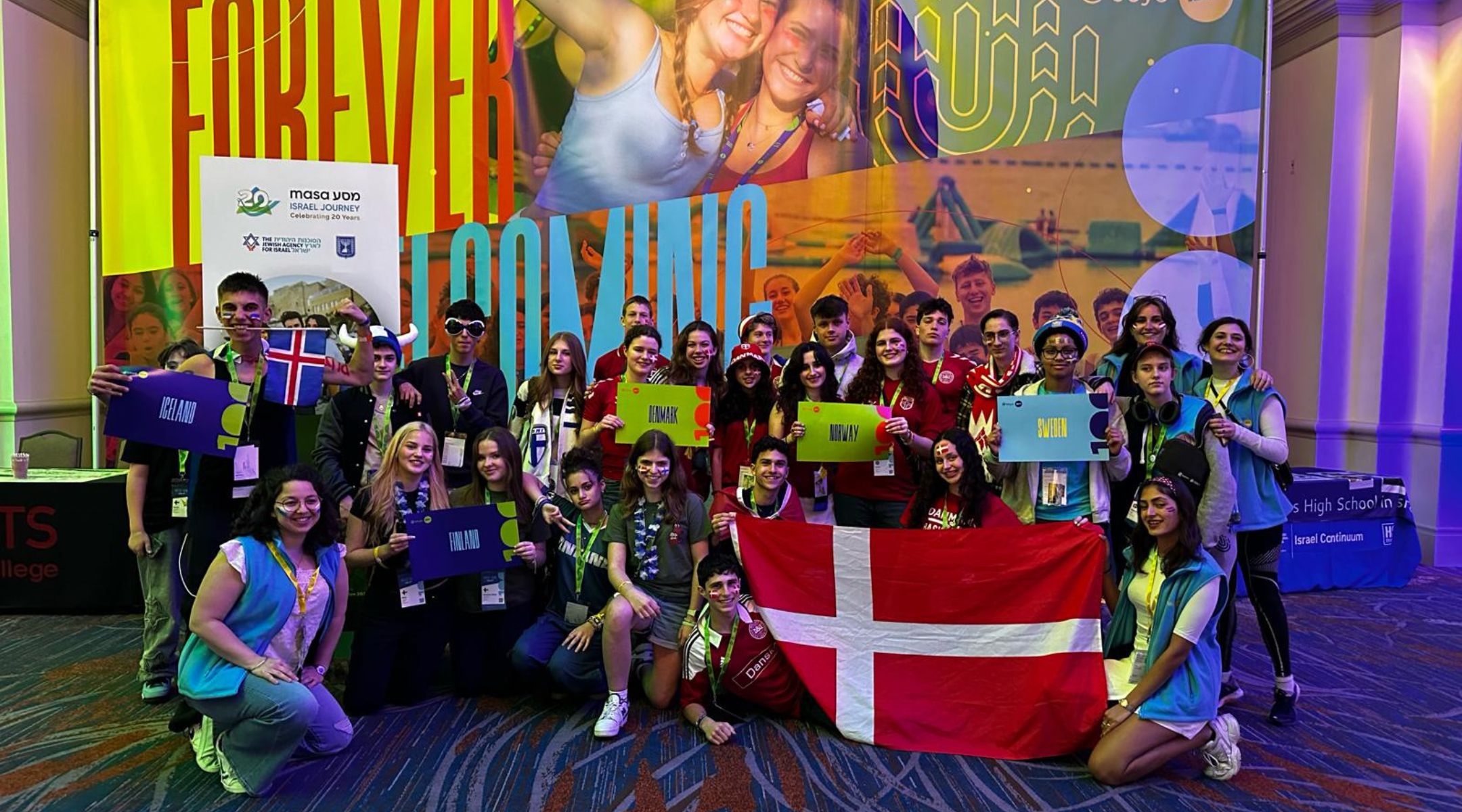ORLANDO — When Elias Joaquin Burgos arrived in Orlando for a Jewish youth group event in February, he found himself surrounded by 3,700 other Jewish teenagers — roughly 15 times the number of Jews who live in the entirety of his home country of Iceland.
Burgos was attending the annual international convention for BBYO, the pluralistic Jewish youth movement, which featured teens from 42 countries. The United States had the largest delegation, with more than 3,000 teens, while sizable groups came from Canada, Argentina, Spain and Germany, plus smaller cohorts from Israel and Ukraine as well.
But as the only Icelandic representative, Burgos had to learn to navigate a packed schedule, not to mention the large convention center’s roughly 60 different board rooms, while jumping from one meeting to the next — from an executive gathering for teens from all countries to smaller get-togethers for Nordic and Western European participants.
“I think that if I would have a huge group of friends around me, I would not go out as much and try to meet new people,” Burgos, 16, told the Jewish Telegraphic Agency during the event. “You also have to be a little bit brave to dive in. But it’s definitely worth it.”
Burgos, who lives in the capital city of Reykjavik, where most of Iceland’s estimated 250 Jews reside, said he had met peers from South Africa, China, Uruguay, Argentina and Colombia. And in the months since the convention, he said he has kept in touch with many of his new friends via the popular messaging platform WhatsApp.
Burgos said meeting Jewish teens from around the world helped him appreciate how different Jewish life looks in each country.
“I think that is really important for people to recognize and to respect,” Burgos said. “If somebody doesn’t want to be the same type of Jew as me, I cannot just say, ‘Oh that’s wrong,’ because at the end of the day, we’re all still Jewish, and we cannot fight in our own society, while still fighting against the people that hate us.”
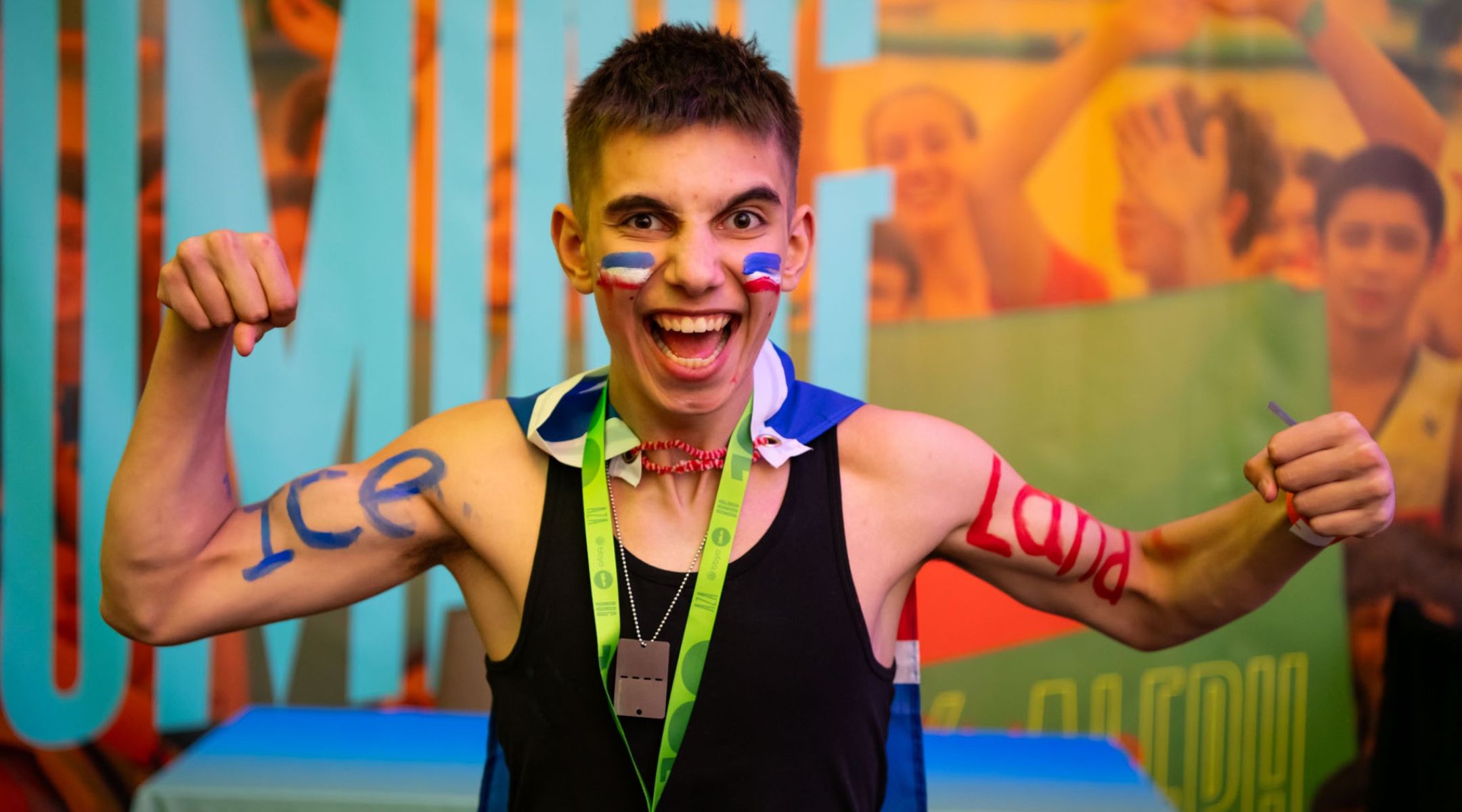
Elias Joaquin Burgos attended BBYO’s convention as the only representative from Iceland. (Courtesy of BBYO)
Burgos, whose parents are from Ecuador and Argentina, was born in Seattle but moved to Iceland when he was 1 year old. His father, a marine biologist, got a job at a research institute that was initially only supposed to last two years. They’ve been there ever since.
Back in Iceland, Burgos said he’s noticed an uptick in antisemitism since Oct. 7. He said pro-Palestinian sentiment is strong in his country, and that he knows of at least 13 Jewish families who have received death threats, though he said the incidents did not receive much media attention.
“Everybody that I know is just constantly posting pro-Palestine propaganda,” Burgos said. “On their Instagram, on their Snapchat, everything on social media. … It’s really sad.”
Burgos said he is very vocal about his support for Israel on social media and doesn’t shy away from engaging with people with differing viewpoints on the issue. He said he’s been targeted once or twice — including when someone directed a “Heil Hitler” at him — but has never been seriously attacked and said he believes that much of the antisemitism in Iceland comes from misinformation rather than hatred.
“If somebody says something about Israel or about Jewish people, I always challenge them if I don’t really agree,” Burgos said. “I try to just understand, where is this person speaking from? Why they’re saying these things.
“I think it’s better to be proud and to be open than to hide. Because then you’re letting the enemy win in a way,” Burgos added.
At BBYO, Burgos was not the only solo delegation. JTA also spoke to teens from Montenegro, Moldova and China to hear about Jewish life back home — from Jewish rituals to weathering various levels of antisemitism.
Djordja Kovacevic, 18, Montenegro
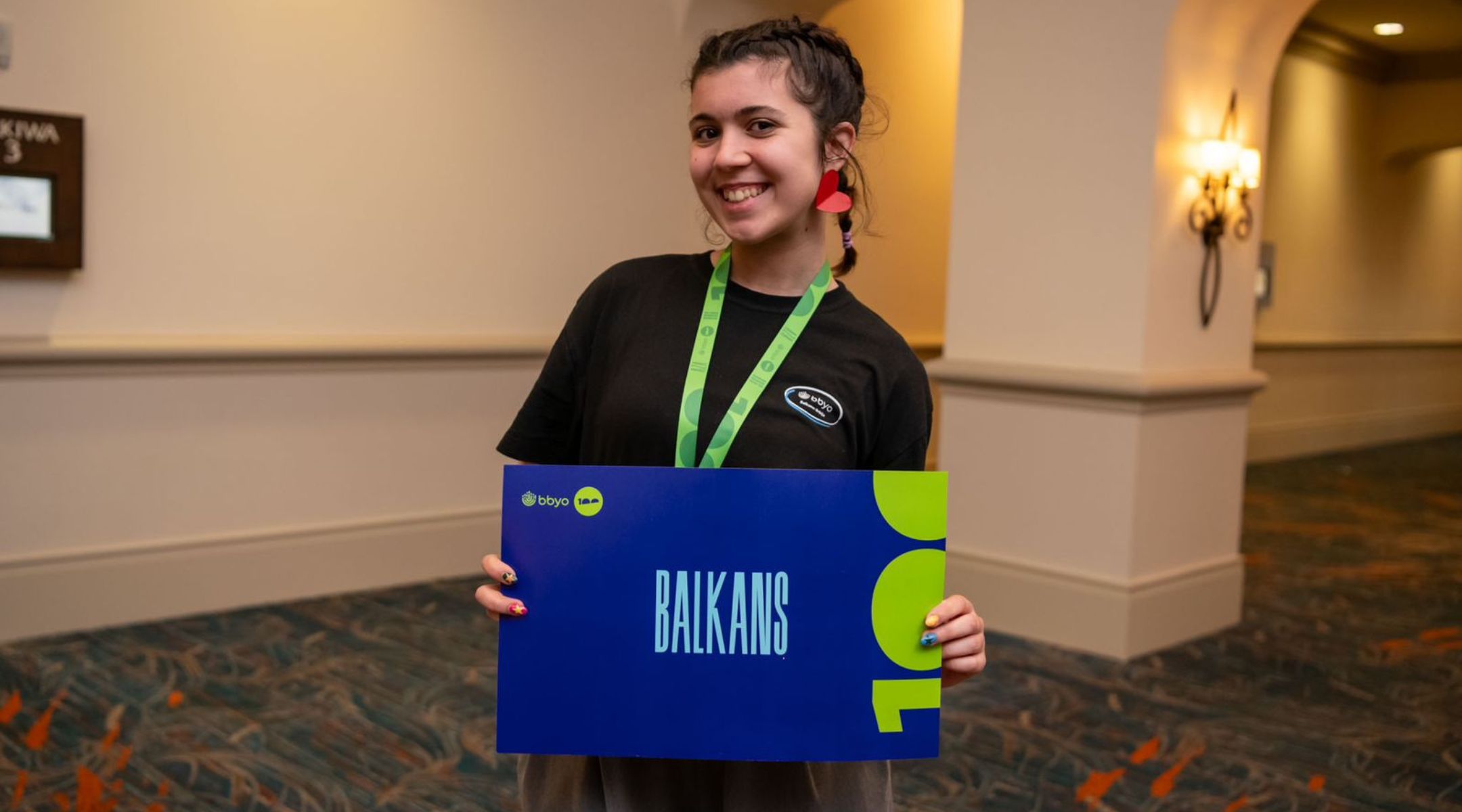
Djordja Kovacevic represented Montenegro at BBYO’s event. (Courtesy of Kovacevic)
Djordja Kovacevic flew over 5,000 miles from her home in Podgorica, Montenegro, to get to Orlando.
Montenegro’s Jewish population sits between 400 and 500, according to the World Jewish Congress, though Kovacevic estimated that the number is even lower. Kovacevic, 18, said she’s only aware of eight Jewish teens in all of Montenegro, a small Balkan country on the coast of the Adriatic Sea with a total population over 600,000. The community hired a rabbi in 2017 for the first time in over a century.
Kovacevic said the Jewish offerings back home are mainly centered around holidays, like Hanukkah. Through BBYO, she said she has met thousands of other Jews — and even had a Jewish naming ceremony on top of Masada, the ancient fortification in southern Israel that is a popular destination for Jewish programs.
Kovacevic said she hasn’t faced much antisemitism in Montenegro, but noted that the dynamic has changed since Oct. 7.
“Before, people would be like, ‘Oh, you’re Jewish. That’s so cool. Teach us something new.’ They were actually interested in learning,” she said.
Since the war between Israel and Hamas broke out, Kovacevic says there has been a lot of pro-Palestinian support in Montenegro, and especially in her area, which is home to a large Muslim population. (Eastern Orthodoxy is the main religion in Montenegro.)
The lack of Jewish community in Montenegro has made Kovacevic appreciate the opportunity to attend BBYO events even more. And she hopes her presence will help pave the way for others in her region to get involved — at home and at international events like the convention.
“It feels kind of lonely that no other people from my region are coming,” she said. “But I feel proud that I’m representing them and that I can be there, like open the door for them so maybe next year they can come.”
Ethan Yang, 16, Beijing
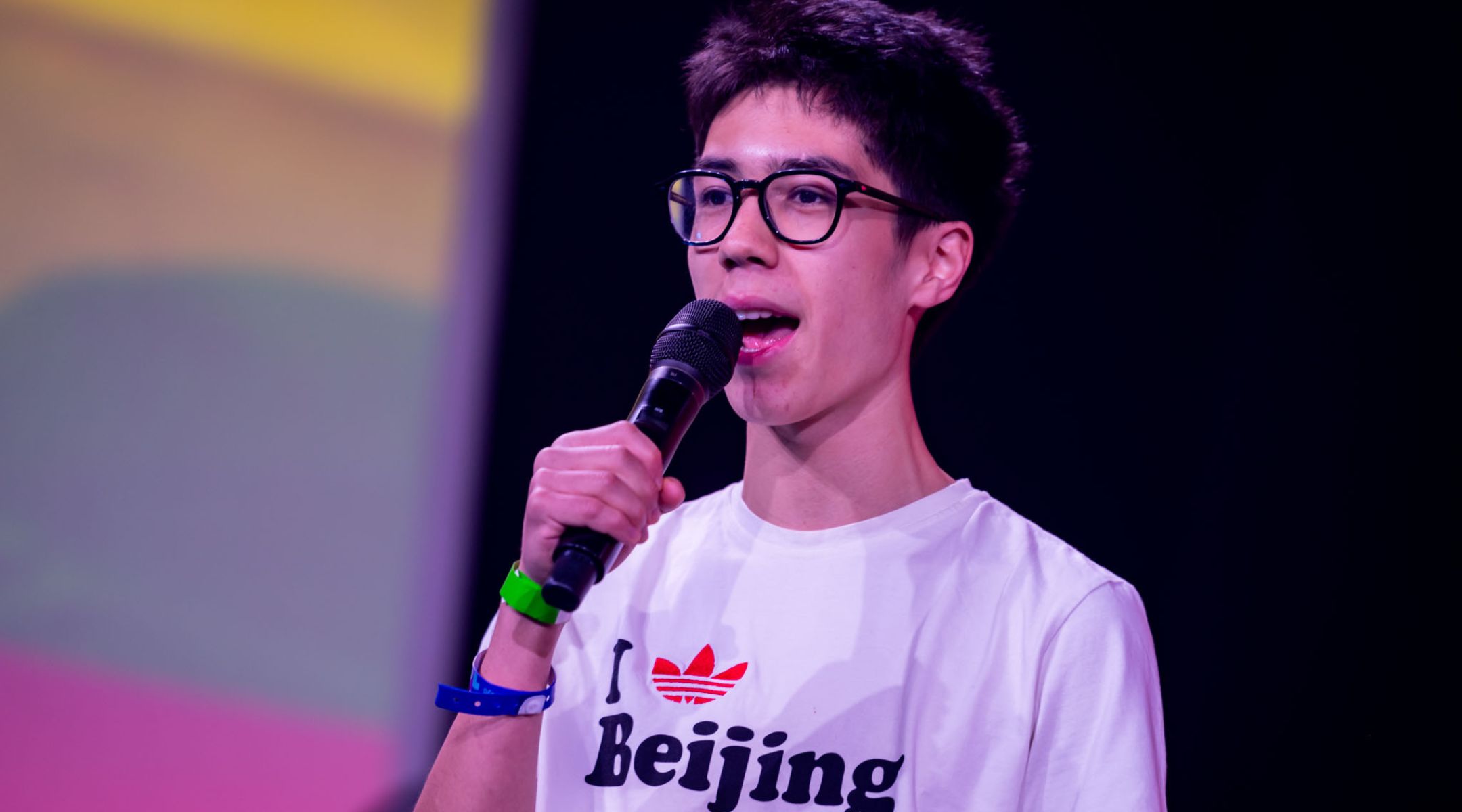
Ethan Yang speaking at a plenary session during BBYO’s International Convention. (Courtesy of BBYO)
For Ethan Yang, meeting teens like Kovacevic and Burgos has reinforced his belief that Jewish community is about quality, not quantity.
“I feel like especially with teens from countries that don’t have a big Jewish community, I can really find that connection, because I feel like it’s always where there’s not that many Jewish people where I feel like sometimes there’s the strongest communities,” Yang told JTA.
Yang said living in China, where an estimated 2,500 of the 1.4 billion people are Jewish, being part of a small community only elevates the experience. His BBYO chapter has around a dozen teens.
“People have to seek out to find a group of Jewish people,” Yang said, “Not like the U.S., where I think it’s easier to find Jewish people around you, so people think it’s normal to see someone who’s Jewish. But in China, when I see someone else who’s also Jewish, we have a closer connection. We stick together.”
Yang said there are two main Jewish groups in Beijing: Chabad and the progressive Kehillat Beijing, which organizes weekly Shabbat gatherings in community members’ homes. Yang said those events usually attract around 20 people.
Outside the Jewish community, Yang said he has not faced antisemitism in Beijing — though he said he was aware of a stabbing outside the Israeli embassy in October that arrived at a time of high alarm.
“When I tell people that I’m Jewish, they’re more surprised,” Yang said. “[For] most of them it’s their first time seeing anyone who’s Jewish. So they get more surprised and more curious about Judaism.”
China has been a particular hotbed of antisemitism since the Israel-Hamas war began — especially on social media sites like Weibo, China’s popular microblogging platform, many of which are closely monitored by the government. In February, a Chinese actor who voices a popular children’s cartoon drew criticism after he made antisemitic comments on social media.
Yang attributed the antisemitism, in part, to many Chinese people’s inclination to diverge from the United States, which they see as primarily pro-Israel.
“Chinese people, they think the Jewish people and Israel are separate things,” Yang said. “So when I say I’m Jewish, they don’t come up and ask me, ‘Oh, what do you think about Israel/Palestine?’”
Taisia Sinkariova, 16, Moldova
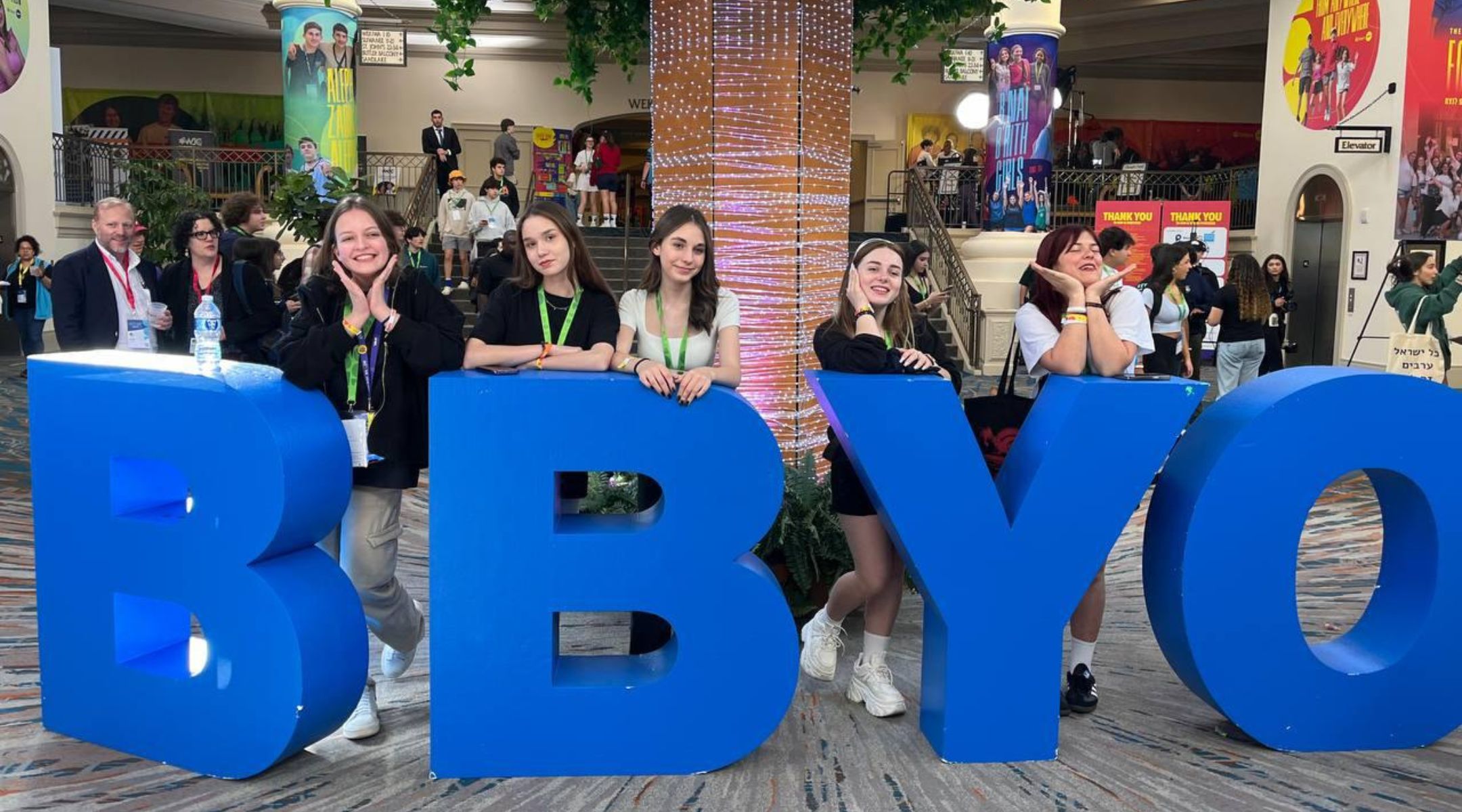
Taisia Sinkariova, standing in the center in a white top, with friends at BBYO’s convention in Orlando. (Courtesy of Sinkariova)
Estimates for the current Jewish population in Moldova range from as few as 1,600 to as many as 30,000. Decades of antisemitic violence — most notably the 1903 Kishinev pogrom — and restrictive religious laws under Soviet and eventually Nazi rule throughout the 20th century decimated a once flourishing Jewish community. And some Moldovans are likely to have Jewish ancestry without knowing it, as descendants of those who converted to Christianity to avoid persecution.
For Taisia Sinkariova, that fraught history manifests every day at school in the capital city of Chișinău.
“In Moldova we have many Jews, and people can say, ‘No, I’m not Jewish,’ but all my friends have Jewish roots,” Sinkariova, 16, told JTA. “Only three of my friends came with me in our Jewish community, but many people in Moldova have Jewish roots.”
Sinkariova said leaders from the local Jewish community have come to present at school, teaching students about Jewish life and the contributions Jews have made in society.
Sinkariova has been involved in her Jewish community through volunteering, in a madrichim (teachers’ assistant) program and as a member of Haverim (“friends” in Hebrew), the Moldovan teen club organized by JDC’s Active Jewish Teens network, which has a partnership with BBYO.
Living in Moldova, a country of roughly 3 million people situated between Ukraine and Romania, Sinkariova said the ongoing wars in both Ukraine and Israel have been prominent issues in the Jewish community.
Roughly 13,000 Moldovans live in Israel, most of whom work in either construction or nursing, and Sinkariova said the Jewish community has been supporting the Moldovan community in Israel, as well as Ukrainian refugees who have been living in Moldova since their country’s war with Russia began in February 2022.
In the days immediately following Russia’s invasion, many Ukrainian Jewish evacuees took refuge in Moldova’s synagogues and Jewish community centers. And Sinkariova said her family has been hosting Ukrainian friends in their second home since the war began.
Coming into BBYO, Sinkariova said being the only representative of her country can be intimidating.
“It’s scary because I need to represent my country, my community,” she said. “But I’m here with my friends from Ukraine and Kazakhstan, with AJT, with my coordinator, and when I’m so scared, they say all’s good.”
JTA has documented Jewish history in real-time for over a century. Keep our journalism strong by joining us in supporting independent, award-winning reporting.
